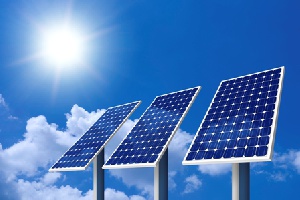The United Nations’ Food and Agriculture Organisation (FAO) has called for strong governmental support to make solar technology accessible and cheap for the populace, in the face of rising demand for power in the country.
Electricity demand currently stands at about 1,800 megawatts per day and is growing at about 10 percent per annum. Electricity production is currently heavily reliant on hydro and augmented by thermal power.
“Currently, the solar technology does exist -- but the issue here is access to the technology and how to make it cheaper. One of the options can be strong support from the government to make it more accessible to local communities,” Dr. Lamourdia Thiombiano, the Officer-in-Charge, Sub-Regional Office of the FAO, said.
Dr. Thiombiano, who was speaking to the B&FT on the sidelines of a conference on “Beyond Rio +20: Emerging Challenges and Opportunities” held in Accra, said the country needs to tap the potential of the sun and explore other sources of renewable and sustainable energy in order to meet its growing energy demand.
“We need energy, definitely, but in Africa 60-80 percent of our energy sources is mainly from wood, so it has an impact on forest and other resources. But on the other hand, we have large potential in renewable sources of energy. For instance, the sun is really important,” he said.
“Currently, in terms of strategic positioning, people are looking at this [solar energy] alternative. So we need to capture the potential of the sun and make it accessible to people and communities so they can use it to cook their food and light up their homes.”
Ghana currently has only two megawatts of solar power installed, at Navrongo in the Upper East Region. The country’s solar power potential ranges between 4,000 kilowatts and 7,000 kilowatts of power per square metre in a year.
The country’s Renewable Energy Act, Act 832, which was passed in 2011, is a response to the global movement away from traditional sources of power like coal and thermal plants to the use of the sun, wind and biofuels for power generation.
The Public Utilities Regulatory Commission (PURC) in collaboration with the Energy Commission and Ministry of Energy and Petroleum recently operationalised the Renewable Energy Feed-in-Rates scheme to encourage investments in the sector.
The feed-in-tariff scheme guarantees a fixed price at which power producers are required to sell renewable energy into the national power grid system.
“In many other countries, wind energy is being explored as an alternative source of sustainable energy. People are also exploring the possibility of using sea-power to produce energy to enlarge their renewable energy base. We have a huge potential, but the issue here is how to make this technology accessible to the populace,” Dr. Thiombiano said.
The VRA, with a total installed capacity of 2,100 megawatts (MW), generates about 1,600 megawatts of electricity -- both hydro and thermal -- every day.
Bui, CENIT, and Sunon Asogli power plants together produce about 400 megawatts of electricity to supplement what the VRA produces.
In the 2014 budget statement presented to Parliament last week, the Finance Minister Mr. Seth Terkper said government plans to add an additional 342MW to the expected installed capacity of 2,845.5MW by completing the first phase of the 220MW Kpone Thermal Power Plant (KTPP), the 110MW T2 (Tico Expansion) and VRA’s 12MW Solar PV project.
The Rio+ 20 conference advocated pragmatic steps to achieve a green economy. A green economy refers to a sustainable economy and society with zero carbon emissions and a one-planet footprint where all energy is derived from renewable resources which are naturally replenished.
Professor Ernest Aryeetey, the Vice Chancellor of the University of Ghana, said: “Infrastructure is important but we don’t want to destroy the environment in the process. The answer will come when we know the cost of cutting trees and killing grass-cutters, drilling boreholes, using generators and others. It may be convenient for us in the short term, but we are not thinking long-term.”
Business News of Wednesday, 27 November 2013
Source: B&FT













